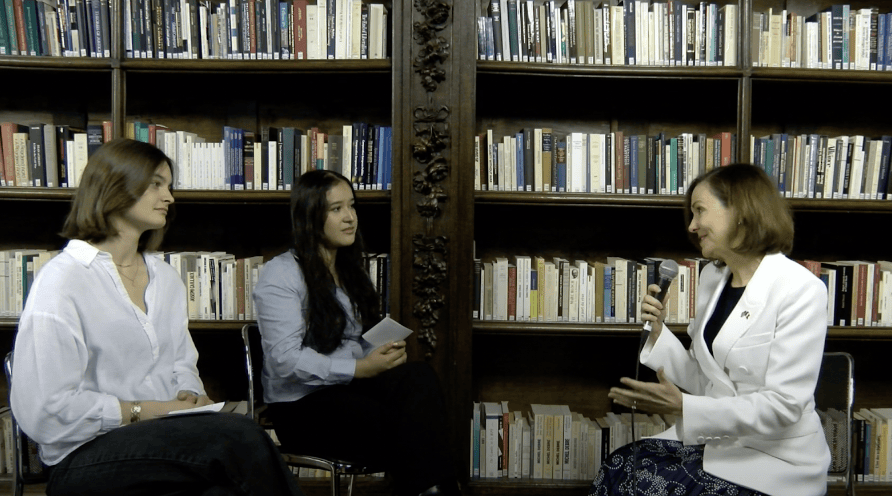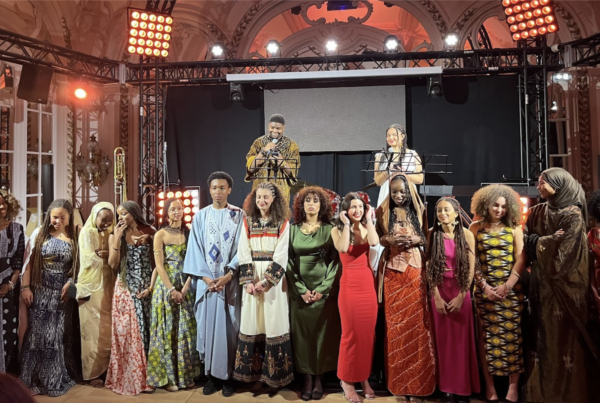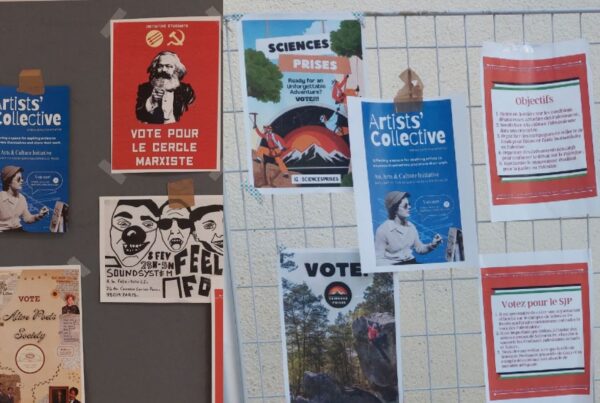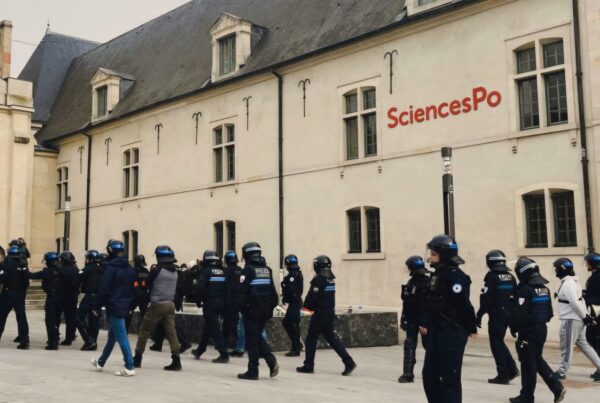Last Friday, April 19th, The Sundial Press had the opportunity to meet and interview Denise Bauer, American diplomat and current United States ambassador to France. The central focus of her exchange with us: the promotion and continuation of transatlantic Franco-American relations for the special occasion of the 80th anniversary of the Normandy landings.
Mira Chawla: Thank you so much for taking the time to speak with us, we are thrilled to have you here with us today. Could you tell us a little bit about your background and working in parallel with France and the United States? Why have you decided to visit Sciences Po, and specifically the Reims campus?
Denise Bauer: Well, as you both know so well, the US and France have a long and rich history. France was our very first ally, we can just start there. We’ve been through many challenges and many triumphs together, so the relationship is incredibly rich and important. Part of that is academic, and of course, Sciences Po is a very respected academic institution, and one of the things that we think about a lot at the embassy is continuing the partnership for the next generation. That’s related to everything we do, the promotion of the values of democracy, and the liberation of France is something that we’re very focused on right now. That, and the 75th anniversary of NATO. So, having a chance to come and talk to a very well-respected university and community, and share our thoughts, but more importantly, hear what you all are thinking about, is a great opportunity for us. And of course, Reims is beautiful, so it’s always a joy to be here.
Erell Renaudeau: As you said, we are meeting on the 80th anniversary of the arrival of American troops in France in June 1944. How do you believe that this shared history, along with all the memorial efforts, informs today’s Franco-American collaboration?
Bauer: I think you hit it spot on: it is a continuing collaboration. If you think about the landings on D-Day, that was very closely coordinated. That, in and of itself, was a partnership with France, to say nothing of all the people who were working in the resistance, involved in so many different ways. And the partnership is essential now too. Of course, in terms of national security challenges, but I would also include the climate. We are working closely with France and it is a priority in both of our countries as well.
Mira: On national television, the former French president Jacques Chirac said that “France will never forget”: How does this history of conflict inform the US today?
Bauer: I think the history of World War II is still with us, and there are still many different lessons to be learned from it. But I would also say I feel the responsibility to keep telling the story and to share it with the next generation, so that everyone continues to appreciate it, because it is a lesson on the value of democracy, overall, and of the partnership, and the importance of the partnership between the US and France.
Erell: Can tell us a little more about the memorial tour you are holding in France right now?
Bauer: As I think you know a little bit, we’ve spent the week doing the Voie de Liberté, and it’s been fantastic. We have been, in addition to seeing all the historic sites, meeting with people and historians involved in the resistance, in the war in one way or the other. But also talking with students, and really, again, thinking about this next generation. And you are already our leaders, and you are going to be even more so in the future, so it’s really important to us that we’re talking to you. And, more than that, listening to you.
Mira: We have an upcoming presidential election in the US in November, one that’s frequently described as a very high-stakes election. What do you think about these stakes for Franco-American diplomatic relations?
Bauer: I would say that the US and France have been allies for 250 years, that’s through a lot of presidents and a lot of political circumstances on both sides of the Atlantic, so I think the relationship is strong, and destined to endure.
Erell: We are also, on the European continent, living through a high-intensity conflict at the moment. Why in this context are our collaborative efforts all the more important?
Bauer: Again, that’s another, you guys are asking such good questions, good journalists, love this! Again, these are shared values, it’s defending democracy. It’s what the US and France and Europe are all about, and so many of our other allies across the globe, and it’s a real marker on how important it is to support democracies and preserve democracy.
Mira: We’re reaching the end of time, so I just want to ask one more question to close things off. France and the US have been allies for a very long time as you’ve mentioned. How have you seen that the relationship between the two countries has evolved in the past decades since WWII? Have we remained as staunch allies as we were then? Or has it maybe wavered or fluctuated over time?
Bauer: That might be a good opportunity to speak more personally, since I can’t speak for everyone involved. I’ve loved France since I was a child, but came here for the first time when I was fifteen, as part of a study program. I think the bond between our countries is extraordinarily strong, through all the cultural things, like study-abroad programs, also through business and trade, and of course through our shared values, and a focus on national security.
Other posts that may interest you:
- The Trouble with ‘Ecocide’
- Carbon dioxide removal – hit or miss?
- Local Victories for Turkish Opposition — A Sign of Hope?
- Are France and Japan a Mismatch Made in Heaven?
- A Reflection on Dark Tourism
Discover more from The Sundial Press
Subscribe to get the latest posts sent to your email.





